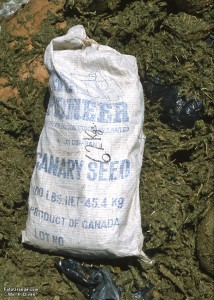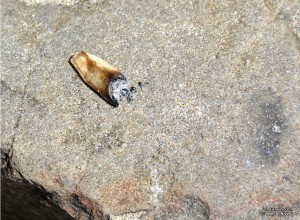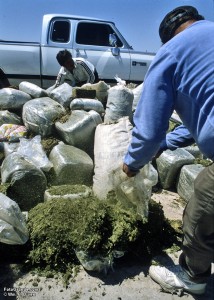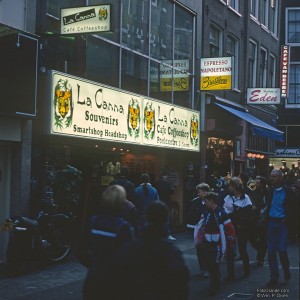My companion’s eyes bugged out in a Looney Tunes SPROING!! when we stepped into a Colorado marijuana store with product samples arrayed across the counter.
This can’t be legal, she said. Ah, but it is.
I was less thunderstruck having seen something similar while on assignment in Amsterdam where sidewalk shop windows display sex for sale while the scent of craft buds pools behind the doors of coffee shops across the city.

Not bird seed but 62 kilo bricks of marijuana ready for the federales’ bonfire in Ciudad Juarez, Mexico. Photo © William P. Diven. (Click to enlarge)
A few months before the trip to Colorado, we were visiting the west coast of Oregon on the day recreational marijuana became legal there. You could now have 8 ounces and four plants at home and 1 ounce on you while out and about. Voters in a statewide referendum made the change effective July 1 although it took a little political magic to start sales in October instead of sometime next year.
“I went downtown after the midnight legalization, and there were like 3,000 people there,” we overheard a Portland guy strolling a beach town say on July 4. The Portland paper reported two women working for a marijuana grower were passing out joints at the spontaneous party to “share the love.”
Until retailing began, Oregonians did what they’d been doing: grow their own, troll the black market or cross the Columbia River to shop the legal retail stores in Washington. Not surprisingly, the four most-profitable pot shops feeding Washington tax streams spread along the Columbia near the Interstate 5 bridge.

Roach on a rock found at Indian Beach, Oregon, two days before marijuana legalization. Photo © William P. Diven. (Click to enlarge)
Here’s a little secret: The War on Drugs is over, and the Prohibitionists lost. The shooting won’t stop soon, and there will be more casualties. But we’ve tipped the tipping point with logic beginning to outdistance 80 years of hysteria especially as it applies to pot.
We actually lost this war early on when tough-on-crime politicians hijacked an issue of personal freedom and public health for their own gain. Take Nixon & Reagan et. al. trashing hippie hopheads and ghetto junkies to win votes at little political cost. Never mind social costs or enabling criminal enterprises currently dosing communities with abundant and affordable chemistry from meth to spice to pills pilfered from mommy and daddy.
Their rhetoric also encouraged voters to move along, nothing to see here, at least until white kids in Albuquerque’s better neighborhoods started dropping from heroin overdoses.
Maybe I’m being paranoid as I set my reefer down.
If there’s a war on drugs going on, how come they’re they all around?
But we’re winning the war on drugs; we’re winning the war on drugs.
Praise the Lord and pass the bong, we’re winning the war on drugs.
— Asylum Street Spankers, 2008.
Reagan, 104 today if he were still around, could have imbibed in illegal liquor during Prohibition as a huge number of citizens did up and down the class and race spectra. Nixon, who’d be 102, maybe abstained since he was raised Quaker, his father’s drinking caused problems at home, and he was a student at a Quaker college when liquor became legal again after nearly 13 corrupting years. Nixon would make up for that omission later in the White House.
Drinkers or not, they certainly knew if there’s money, especially big money, to be made by flouting an unrealistic and broadly unpopular law, smugglers will do their duty. If the United States learned that lesson in the 1920s, we quickly forgot it.
With Prohibition’s abrupt end in Dec. 1933, it’s easy to connect the dots from the federal anti-booze bureaucracy to the anti-drug bureaucracy formed a few years later. Propaganda turned marijuana into the killer weed invading from Mexico to rape and pillage anglo America, and so the war began. Honest criminals, meaning the Mafia, generally steered clear of drugs until the old codes broke down and they became simply another player among the cartels and freelancers.
On one side you’ve got a bunch of paranoid, schizophrenic idiots trying to break the law, and on the other side you’ve got a bunch of paranoid, schizophrenic idiots trying to enforce the law. If they keep talking about a drug war, they’ll have one.
— Ted Johnston, marijuana smuggler, Las Cruces, N.M., interviewed 1983.

Walking the dog on Short Sand Beach, Smuggler’s Cove, Oregon. Photo © William P. Diven. (Click to enlarge)
Smuggler’s Cove on the Oregon coast earned its name during liquor Prohibition when savvy cabals in British Columbia dispatched legal Canadian whiskey and Scotch by the boatload south into innumerable sheltered beaches all the way to California. A go-fast boat, a prearranged signal, and the rumrunner offloads and speeds back to the mother ship unmolested.
In October, only a few hours before Oregon joined Washington and Colorado in Club Weed, the mayor of New Mexico’s largest city vetoed for the second time a City Council bill taking the crime out of possessing small amounts of weed for personal use. Care to guess who’s dealing with reality and who’s feeding on hysteria? Yep, reefer madness is alive and well in ol’ New Mexico where marijuana once grew wild on the ditch banks and curanderas prescribed it to women for menstrual cramps (and probably still do).

Marijuana destined for U.S. consumers intercepted by Mexican federal police. Photo © William P. Diven. (Click to enlarge)
Truth is pot is de facto legal here already as it was even before the Columbus Air Force night-bombed the state with bundles of Mexican product from the Sierra Madre. Now it’s an easy drive to Colorado where marijuana tourism sprouts as friendly businesses welcome you and your cash. Oh, yeah, and local growers here work their green-thumbs to the nubs outcompeting Mexican farmers and exporters who once held a virtual lock on the New Mexico market.
Take that, NAFTA.
But given Albuquerque’s ugly and worsening crime problem, the Republican mayor, holding a purportedly nonpartisan office but presumed to be running for governor in 2018, can’t appear soft on hippies and hopheads, can he? No matter that they’re not responsible for the violence, death-race freeways and the waning public confidence in his leadership and the Albuquerque Police Department (see my post Reforming The Impossible»»).
I only bring up the mayor’s political affiliation because it was a conservative Republican legislator in Oregon, whom pot advocates expected to be their No. 1 enemy, who saved the day. Turns out state Sen. Ted Ferrioli already knew a lot about the failed Prohibition of the 1920s. His father was a liquor salesman, and granddaddy had been a bootlegger.
“I wasn’t at all conflicted about my role in trying to facilitate the end of prohibition. I asked myself, ‘If I had been alive at that period of time, what would I have done to help end Prohibition?”
— Sen. Ted Ferrioli, R-Salem, quoted in the Portland Oregonian, July 1, 2015.
Not only did Ferrioli lead the charge in turning the referendum into law, when state bureaucrats said they couldn’t get rules in place until next year, he found a simple expedient: let established medical-marijuana dispensaries sell retail while the state bureaucracy catches up.
He also abetted a critical compromise based on voter sentiment. The 15 eastern counties where voters rejected the referendum received local-option power to ban marijuana businesses. In the other counties, changes would require another referendum.
- Recreational Marijuana FAQ from Oregon.gov»»
For what it’s worth, I wrote my first anti-Prohibition editorial about 40 years ago. Since then I’ve seen nothing to change my mind about there being better ways to deal with everything from a pot plant in the backyard to the nation overdosing on legal pharmaceuticals. Turning a significant percentage of our youth and neighbors into criminals and social outcasts still makes no sense.
The Netherlands figured that out beginning in 1976. By separating cannabis — marijuana and hashish — from hard drugs like heroin, pot smokers no longer dealt with dealers trying to lure them into the harder stuff. Heroin became a matter of public health, and over time the average age of a heroin user began to rise showing fewer young people were getting hooked.
Recently the Netherlands backtracked on its permissive attitude toward cannabis pushing some of the business back underground. Elsewhere, however, the scent in the air is not just smoke but change. Newsweek describes Spain as the new Old Amsterdam for marijuana tourists. And just last week Mexico’s Supreme Court ruled growing marijuana for personal use should be a protected human right, this in a conservative country mired in a real mass-shootings drug war.
The 200 or so cannabis-dispensing coffee shops in Amsterdam still operate in a legal gray zone since cultivation and possession remain illegal. Possession of several grams of smoke can result in confiscation but not prosecution although new pressure on growers is complicating things. Critics of government policies have begun touting the American model of legalization and taxation as a better way.
And like Colorado, Washington and Oregon, the Netherlands prohibits smoking in public. Driving isn’t as much of an issue given Amsterdam is a walkable city with extensive public transportation although they do fish a lot of bicycles out of the canals.


